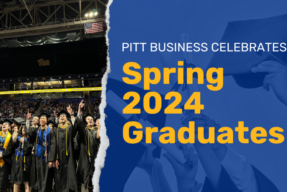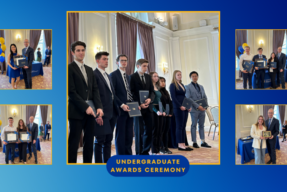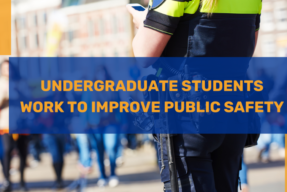Each year, Pitt Business students focusing in accounting volunteer for the school’s Volunteer Income Tax Assistance (VITA) program. The IRS program offers free tax help to people with low-to-medium incomes, as well as the elderly, people with disabilities, and those with limited English fluency.
This year, the program took place virtually through a platform called Getyourrefund.org. This non-profit service built by Code for America, is in partnership with the IRS Certified VITA sites nationally and is United Way’s approved platform for the tax coalition.
Student volunteers included James Campbell, Tyler DeKorte, Chase Diehl, Joshua Gailey, Hannah Graybill, William Helenski, Jo Murao, Jonathan Nemtuda, Maia Perks, Annalise Stonecipher, and Benjamin Walters, who provided over 450 hours of service.
Accounting professor and faculty advisor for the school’s information professionals’ honor society, Beta Alpha Psi, Jocelyn Carlin served as site coordinator alongside site coordinator Ingrid Gomez-O’Toole.
By being virtual, the program was able to help beyond Pittsburgh and serve areas throughout the state, reaching out to other surrounding counties such as Harrisburg, Philadelphia, Greensburg, and Lancaster. However, there was still quite a learning curve to figuring out how to best serve the community on a new platform. While Carlin and Gomez-O’Toole could usually rely on training students in person, this year presented a challenge by having to train them virtually. To overcome that, students were paired with one of the advisors, who was just a phone call away to answer any questions that arose during the process.
“Part of the difficulty was that neither us nor the taxpayer knew we how this was going to work before the season,” says Carlin. “But on the other hand, we were able to process just as many tax returns and, because of the stimulus money, and people who didn’t get their stimulus money, we were able to get that for them and resolve all of those issues so they were made whole. As the tax season progressed, I know that people got their returns very quickly. The platforms worked exceptionally well.”
This is the program’s third year of operation. What began in a small corner of the Carnegie Library has now generated over hundreds of thousands of dollars in refunds. This year, the program was able to get back more than $360,000 in refunds to their taxpayers – over a $160,000 increase from last year’s total.
Annalise Stonecipher (BSBA ’21) was able to connect to the program through the school’s honor society, Beta Alpha Psi.
“Since I was about to take the tax class at Pitt and had done a summer tax internship, it seemed like a really good opportunity to gain experience while also benefiting the community of Pittsburgh,” says Stonecipher. “Also, my dad participated in a similar program as a college student and said that it was a great experience for him, too. I was nervous going into it, but really liked being able to directly interact with the community and those I was helping while also getting more experience in my field.”
Since 2002, Pitt Business students have volunteered in VITA projects as members of the Beta Alpha Psi. However, the VITA sites were always off campus and were sometimes run by other local colleges and universities.
In the summer of 2018, the David Berg Center for Ethics Leadership worked with a Pitt Business accounting student and Carlin to develop a plan for an income tax assistance program for individuals in financial need—those with annual incomes under $57,000 per year. Pitt Business accounting students provide the tax assistance by going through an extensive training session while making a commitment to volunteer from mid-January through the end of tax season, which for both 2020 and 2021, was extended beyond April 15th.
This program challenges accounting students to consider the community impact of accounting while gaining experience in working with individual taxes. It has also broadened the Berg Center’s impact by including accounting faculty and students in a program that has a direct benefit to the residents from communities in and around the University’s Oakland campus as well as assisting our international population.
Typically, volunteers tend to be accounting students looking to partake in an independent study and broaden their experience-based learning. However, Carlin welcomes anyone to help with the program and hopes to one day see anywhere from 30-40 participants volunteering each year.
“It is very possible, if we had the appropriate capacity and oversight, for literally anyone on campus, regardless of major to volunteer,” says Carlin. “You need no tax experience at all. If you can read, write and use a computer, I can teach you how to do taxes.”
As the program grows and gains appropriate oversight, anyone on campus could volunteer in different capacities. One way the program seeks to grow is adding volunteer translators. This year, Gomez-O’Toole served as the primary translator for Spanish speaking taxpayers, but Carlin aims to get more bilingual students involved in the future.
“It was rewarding,” says Gomez-O’Toole. “Trying to find a safe place for them and trying to help them understand the tax process in the U.S. is important.”
Feedback from members of the community who have been involved with the program has been unanimously positive. Volunteers are able to help taxpayers take advantage of free tax deductions and credits, such as the earned income credit (EIC), which can be a large benefit to local taxpayers.
Carlin also notes that the personal relationships preparers are able to build with the taxpayers help create a safe and comfortable space for them during what can typically be a stressful process. By getting to know the taxpayers and their family stories, volunteers at the site can refer these taxpayers to additional Pitt resources beyond just taxes, such as applications and scholarship opportunities.
“That’s what I love so much,” says Carlin. “As part of the Pitt community, the most amazing resources are at our fingertips.”
The VITA program hopes to resume in-person preparations next year, while also keeping virtual preparation as an option. Having one year of being completely virtual under their belt, the team feels prepared to expand and serve more people in the future.
“We have grown in terms of getting to the advanced level of international returns and international certifications,” says Gomez-O’Toole. “I think we have a better understanding of the whole process. It’s going to help us grow even further.”
Stonecipher will be returning to Pitt Business next year as a student in the master’s in accounting program and hopes to help with the VITA program again.
“I’m really excited to be able to stay at Pitt and participate in the program again so I can use my experience from this past tax season to be even more helpful next season,” says Stonecipher. “I am also looking forward to the possibility of next tax season being in person and being able to interact more with other volunteers as well as the clients.”
The continued growth of the VITA program will continue to make Pitt Business such an integral part of the Pittsburgh community.



